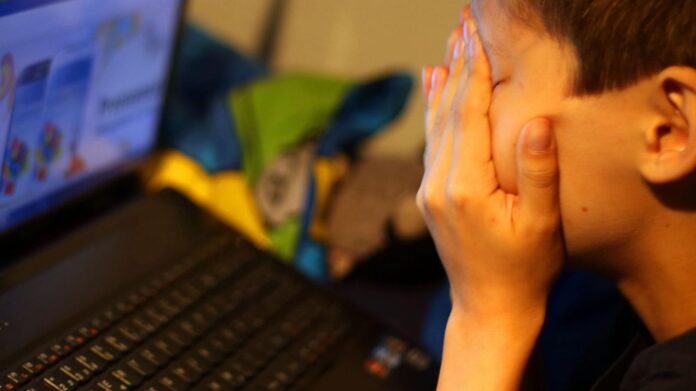
Embarrassing videos and photos, mercilessly harassing posts, hate speech and insults in the digital space: According to a survey, a large majority of the population considers cyberbullying to be an urgent problem and is in favor of stricter legal measures. This is the result of an online survey conducted by the Civey Research Institute among 2,500 people aged 18 and over nationwide, which was commissioned by the Cybermobbing Help Association in Schwerte.
Three quarters of those surveyed (almost 76 percent) believe cyberbullying is a major problem, said association chairman Lukas Pohland to the German Press Agency. There is a great deal of dissatisfaction with the existing laws: almost two thirds (64.5 percent) believe that the current criminal law provisions are not sufficient to effectively protect those affected. And around 64 percent also believe that the introduction of a separate criminal offense for cyberbullying is the most effective measure to combat the problem.
Many countries have laws against cyberbullying – Germany does not
The majority of the population is demanding decisive legal measures and more protection, which means a clear mandate for politicians, 20-year-old Pohland summarized the results.
The Alliance Against Cyberbullying (Karlsruhe) also warned that a separate law against cyberbullying is needed, which already exists in many other countries such as Austria and France. Many people do not even know that they are committing a crime when they post defamatory images online and make malicious comments, said board chairman Uwe Leest to the dpa.
The Internet is playing an increasingly important role in everyday life, as the “Leisure Monitor 2024” recently showed. “A cyberbullying law would be like a red light,” said Leest. It could deter perpetrators. And victims would be encouraged to go to the police. According to the alliance’s experience, the current situation is as follows: “When we report a cyberbullying case to the police, it usually ends up at the bottom of the pile.”
Cyberbullying can affect anyone
It is “frightening that the serious consequences of cyberbullying that victims experience on a daily basis are not adequately covered by criminal law,” criticized Pohland, who as a boy once helped a bullied schoolmate and was himself a victim of cyberbullying. At the age of 14, he began to actively combat the problem, almost from his bedroom, and was already considered a sought-after expert by his teenage years. “Politicians can no longer ignore the reality of the digital age.”
The Federal Government’s Commissioner for Child and Youth Protection, Kerstin Claus, and the platform Jugenschutz.net recently complained in a similar way that there is practically no protection for children and young people on the Internet.
Uwe Leest made it clear: “Anyone can become a victim of cyberbullying.” However, younger people are disproportionately affected: In the 10 to 18 year old age group, the figure is estimated at 16 to 18 percent. Cyberbullying experiences are particularly common during puberty (13 to 16 years), with around 25 to 30 percent of those affected.
The consequences can be serious
The common consequences include fear, withdrawal, absence from school, anger, eating disorders, depression and even suicidal thoughts, reported Uwe Leest. “With cyberbullying we usually experience psychological injuries. Such stress is not something you can get rid of quickly.”
Lukas Pohland and several young colleagues between the ages of 14 and 21 have been running a nationwide online cyberbullying advice platform for children and young people in need for several years. “It turns out that advice from peers is a complete success and that real help can be provided on an equal footing.”
At the same time, the counseling work reveals the sometimes dramatic consequences for those affected, as Pohland described. The University of Berlin evaluated online counseling and found that unwanted forwarding of images often leads to feelings of shame and inferiority in girls. And: “According to study results, anorexia is the second most common type of self-harm in cyberbullying.”
Experts also see federal politics as having a duty
The Federal Ministry of Justice must take legal measures, demanded the Cyberbullying Help. The recent negative statements by Federal Minister of Justice Marco Buschmann are incomprehensible, said Pohland. In June, the interior ministers of the states spoke out in favor of a separate criminal offense for cyberbullying. Buschmann had opposed a separate cyberbullying regulation in the penal code. The constitutional state already has many instruments at its disposal, the FDP politician said in July. Above all, such crimes must be consistently investigated and prosecuted.
Leest said that with a separate criminal offense and a cyberbullying law, the police would “have something in their hands that is clearer and more tangible and that will hopefully lead to convictions.” If the problem is to be brought under control, legal prevention is also needed. That is an important building block.
Parents also play a major role. And prevention work in schools must progress. The alliance is active in around 200 schools every year. In schools in particular, perpetrators must be identified and expelled from school; the alliance chairman is convinced that this will send a signal. Lukas Pohland warned: “It is high time that the Internet was not left a crime-free area.”
© dpa-infocom, dpa:240901-930-219286/1
This is a message directly from the dpa news channel.
